The young Vietnamese helping tackle the illegal wildlife trade
Trang Nguyen is a rarity in Vietnam where civil society is viewed with scepticism and most young people want more lucrative careers.
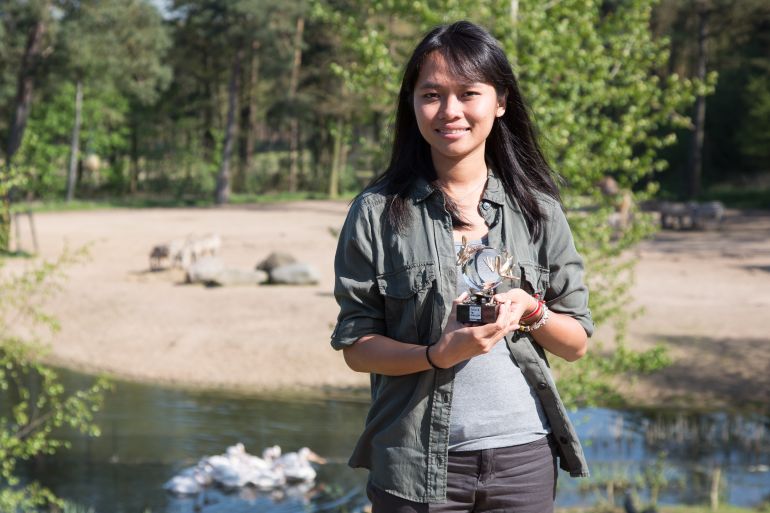
Standing on top of a four-wheel drive looking out at a central Kenyan wildlife reserve wearing a bucket hat and walking boots, Trang Nguyen stands apart from most Vietnamese who prefer European charm and East Asian wonders for their holidays and photographic memories.
But Trang is no ordinary traveller.
Keep reading
list of 4 itemsEndangered Sumatran tigers in Jakarta zoo infected with COVID
What’s behind the US trade in exotic animals?
The Poachers Pipeline: Exposing wildlife trafficking
The 31-year-old founder and executive director of WildAct, a Vietnamese conservation NGO, travels the world as a wildlife conservation scientist.
In a fast-growing economy where most people eye lucrative jobs in business and finance and the government regards civil society with scepticism, if not hostility, she stands out.
‘’My parents weren’t too supportive when I told them what I wanted to do,’’ Trang told Al Jazeera, acknowledging that few Vietnamese would see what she does as a dream job.
But there is little else she can imagine herself doing.
‘’I enjoy doing research and so I [have] spent much of my time in the field, in remote areas and sometimes also putting myself in dangerous situations. No parents would want their child to go through that,’’ she said.
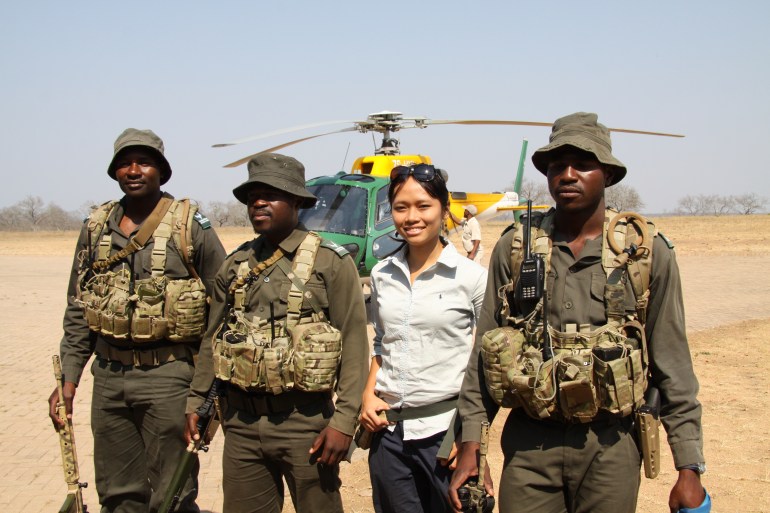
Vietnam, which has emerged as a hotspot in the multibillion-dollar global trade in illegal wildlife, serves as both a transit route and a major consumer market. Vietnamese crime syndicates have been documented operating as poachers and smugglers in a host of source countries throughout Africa and Asia, from Malaysia to Mozambique, according to the UK-based Environmental Investigation Agency (EIA).
The EIA says that in the 17 years until 2019, Vietnam was involved in more than 600 seizures linked to illegal trade, involving the deaths of at least 228 tigers, 610 rhinoceroses, 15,779 elephants, and 65,510 pangolins – all species that are in critical danger. The group based its figures on publicly available data on seizures.
In terms of the consumption of tiger parts and products, Vietnamese are second only to the Chinese.
Many people believe that what they call “bone glue”, or cao in Vietnamese, which comes from animals like tigers and monkeys, can help treat joint-related ailments. Rhino horns, meanwhile, are a symbol of affluence, with some believing the horn can cure cancer.
Trang herself is a colon cancer survivor and was struck by a comment from her doctor that such beliefs were dangerous given the need for early treatment with many cancers.
It was a “powerful message”, she told the World Wildlife Fund in an interview this year, and an effective way for her to tackle the continuing demand for rhino horn.
Hostility and denial
Rising concern about zoonotic diseases in the wake of COVID-19, which is widely believed to have jumped from animals to humans, has helped put the issue of wildlife trafficking back on the world’s policy agenda.
Vietnam last year issued a directive to halt the already illegal import of wild animals, including parts and products. While conservationists have said they support the directive, they also caution much work needs to be done, including the implementation of the directive.
Trang, who began participating in environment-related activities when she was a teenager and received her PhD in biodiversity management in the UK two years ago, says working on wildlife trafficking is not easy because it is a sensitive topic for both Vietnamese authorities and citizens.
In several public conservation forums in which she has participated, Trang says people have reacted to Vietnam’s position as a wildlife trafficking hotspot with hostility and denial.
“I don’t dare to say I am an expert, it is just that I have spent a lot of time researching this topic. It is undeniable that wildlife animal consumption exists in Vietnam,” she said. “There are Vietnamese people overseas, especially in Africa, who are directly participating in illegal and transborder and transcontinental wildlife trade. This has an effect on Vietnamese diaspora and the image of the country.”
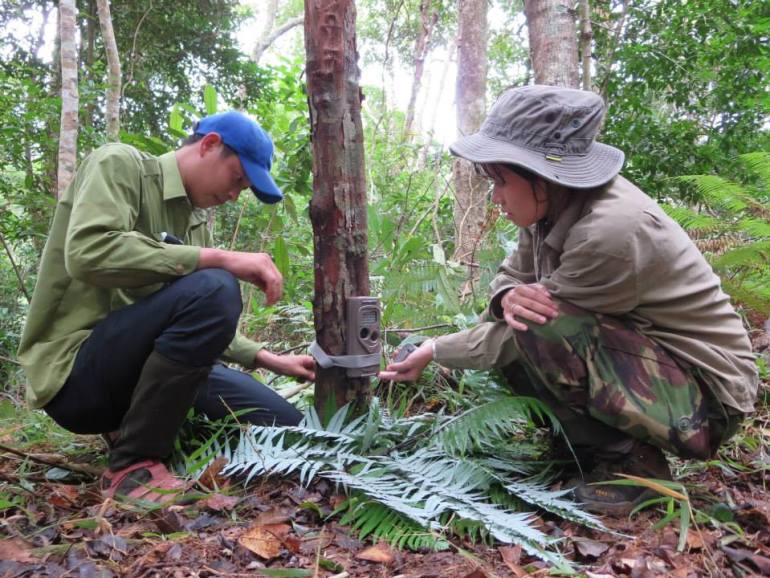
It is a reputation that has also made some sceptical about Trang’s intentions, she said.
In Africa, she says she has also encountered hostility – with some people assuming she must be working against wildlife protection because so many Asian people have been involved in high-profile wildlife trafficking cases on the continent.
In Vietnam itself, safeguarding wildlife is also a challenge. Some of the critically endangered species, according to the IUCN Red List of Threatened Species, are the Vietnamese pheasant and the pond turtle. Saola, an antelope-like animal, has also become a victim of a massive increase in hunting to supply the illegal wildlife trade, according to the WWF.
Vietnam was one of the worst-performing countries in Asia (including India and some Southeast Asian countries) alongside Myanmar, in terms of policies and laws to protect animals, according to international animal welfare charity World Animal Protection’s 2020 index.
A “very damaging assumption” held about the conservation sector, according to Trang, is that authorities and environmental police do not do anything to curb wildlife exploitation. In her experience, Trang says she has met many rangers and police who are committed to eradicating the problem and are willing to collaborate with NGOs like hers.
However, she says many Vietnamese law enforcement officers have limited experience in investigating and addressing wildlife crimes compared with other countries due to a lack of access to education and training. This is on top of the problem of corruption.
“Corruption plays an important role in this trade, as in many other crimes, and it is crucial to address this issue to combat the illegal wildlife trade,” she said, without giving a specific example.
“They have many experiences in investigating other things, but [investigating] wildlife crimes and wildlife animal-related matters have only recently been a thing in Vietnam. This is something we have to acknowledge and support them with,” she said.
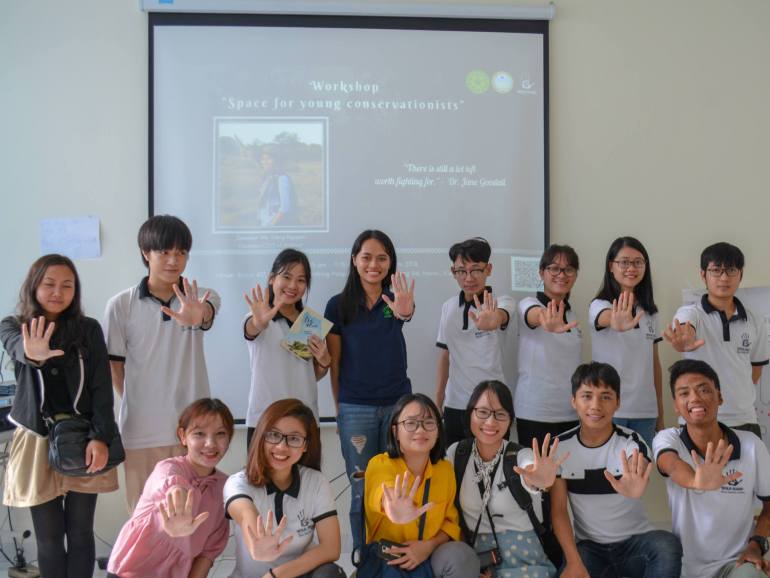
WildAct has been running training programmes for local communities and rangers where they can exchange knowledge, plan and implement conservation projects, such as removing animal traps and rescuing trapped animals, in several provinces in Vietnam.
Empowering communities
The organisation is collaborating with Animal Doctors International, a veterinary clinic and animal welfare consultant with offices in Vietnam and Cambodia, to provide rangers and WildAct’s community conservation team with training on administering first aid to injured animals and to members themselves while on patrol. Although often overlooked, these are important skills to improve the survival rates of wild animals after rescue, as well as the wellbeing of the rangers and community members, according to Trang.
“The right way should be to empower as many people as possible,” she said.
Trang has sought to empower women and make WildAct a bastion of gender equality.
According to Mark Spicer, a former programme manager who worked at WildAct for two years until the end of 2020, Trang’s advocacy is not lip service.
“It is a key part of where WildAct came from, with Trang as founder and director, and her experience and the experiences of colleagues in conservation both in Vietnam and abroad have only served to reinforce that,” Spicer said, who said he was the only male employee by the time he left the organisation.
Spicer, who comes from the UK and has a background in conservation and ecology, says the work he did at WildAct was ‘’unlike anything I had ever done’’.
“That said, there’s a huge amount to be done in conservation in Vietnam and for everyone involved it’s a challenge, but there are some great organisations and highly motivated people trying to do it,” he said.
Trang founded WildAct in 2015, and she also kept herself busy at other environmental organisations in the early years, working as an illegal wildlife trade technical adviser in Cambodia for UK-based Fauna and Flora International and a liaison officer in Mozambique for the US-based Wildlife Conservation Society. In 2018, she was awarded the prestigious Future for Nature award for her work to combat the illegal wildlife trade.
Hong Hoang, founder and executive director of CHANGE, a Vietnamese NGO that focuses on addressing the country’s critical environmental challenges, says people like Trang are rare in Vietnam.
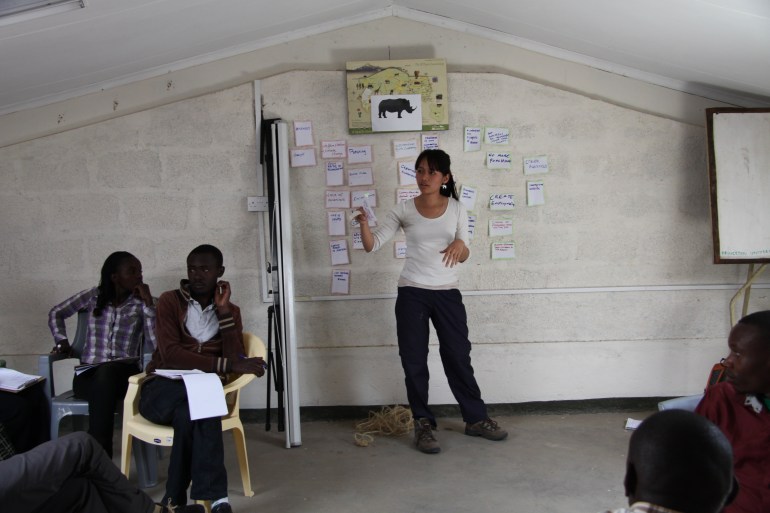
She first met Trang when the latter, then a teenager, volunteered for a programme run by the WWF, Hong’s former employer. The two have remained in touch and occasionally cross paths in the small world of Vietnam’s environmental campaigners.
For CHANGE’s research, Hong also relies on the conservationist’s expertise in animal studies to help her identify a captured animal she comes across on social media or news articles.
Hong, a pioneer and prominent voice in the climate movement with more than two decades of experience, says there has been a “snowballing effect” and young people are increasingly interested in environmental issues.
The government is also taking more notice than it did before, making it less risky for people to raise their concerns in a country where dissent is barely tolerated.
“I have to admit that the government has grown to care more about environmental issues,’’ she said, adding that there had been pressure from the international community and social media where users expressed their awareness of the impact some issues like air pollution have on their health, jobs and the economy.
Still, Hong believes there is still a long way to go.
“I think it is not at the level enough to build a strong movement in a 98-million population,’’ she said. “I hope there will be more people like Trang in Vietnam and there will be more opportunities for young people in conservation and wildlife matters.”
In August, police in north-central province Nghe An rescued 17 mature tigers from a squalid basement that was part of an illegal breeding operation. A few days earlier, in the same province, two men were arrested after seven live tiger cubs were found in their car.
Trang said that, in the same week as this seizure, scientists in Kenya successfully created embryos to save the functionally extinct northern white rhino.
“This is wonderful news, but in a perfect world where there would be no poaching – this species wouldn’t need human help just to ‘survive’,” she said.
“Similarly, these tigers should not be locked up in cages, but the seizures brought us hope, as it shows successful collaboration between the authorities and NGOs to tackle this issue.”